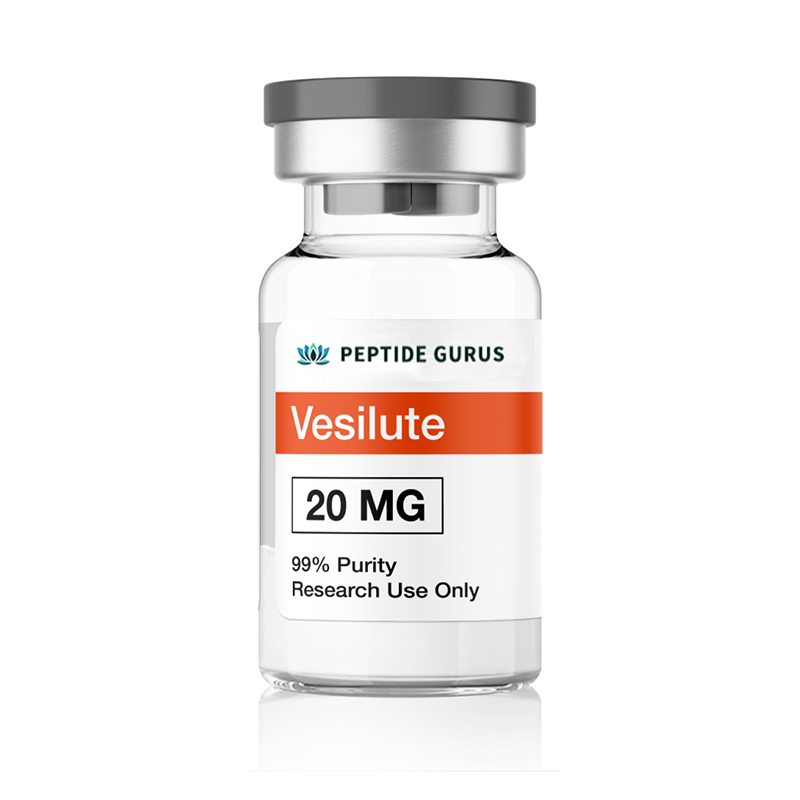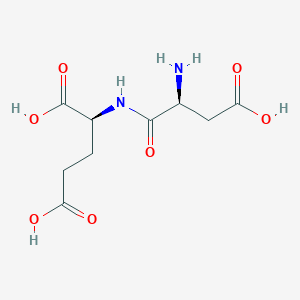



Categories: Peptide Bioregulators, Peptide Finished product, Peptides and Their Dosages
Free (1) 30 ml Bacteriostatic Water
with qualified orders over $500 USD.
(excludes capsule products, cosmetic peptides, promo codes and shipping)
Product Usage: This PRODUCT IS INTENDED AS A RESEARCH CHEMICAL ONLY. This designation allows the use of research chemicals strictly for in vitro testing and laboratory experimentation only. All product information available on this website is for educational purposes only. Bodily introduction of any kind into humans or animals is strictly forbidden by law. This product should only be handled by licensed, qualified professionals. This product is not a drug, food, or cosmetic and may not be misbranded, misused or mislabled as a drug, food or cosmetic.
Dipeptides are either organ-specific or are widely present throughout a variety of tissues. Vesilute is one of the latter dipeptides, being found throughout the body[1]. Vesilute is one of the least studied Khavinson peptides, but has shown some effect on bladder and genitourinary system tissues. Research reports indicate that it Vesilute can improve bladder function, particularly in the elderly, assisting with chronic cystitis, benign prostatic hyperplasia (BPH) and a variety of urinary problems. The peptide has important organotrophic effects in the prostate as well, helping to prevent cell proliferation and prostate enlargement. Research suggests that this effect may be the result of improvements in microcirculation.
Vesilute and other cytomedines appear to have beneficial effects on sperm quality and fertility. Research out of Russia indicates an increase in sperm production, health, and viability with administration of cytomedines. There is, additionally, a decrease in the number of abnormal sperm. All of these effects serve to increase fertility[2].
Interestingly, the Glu-Asp peptide, along with twelve other dipeptides, has been shown to be responsible for umami flavor in a variety of settings[3]. Though not directly related to health and wellness, the fact that these peptides produce a desirable flavor suggests that their ingestion may be encouraged via evolutionary taste mechanisms. This could, though by no means has been proven to, indicate that these peptides have an important role in basic biochemical processes. Vesilute and other cytomedines have been shown to be orally active[2].
Amino Acid Sequence: Glu-Asp (ED)
Molecular Formula: C9H14N2O7
Molecular Weight: 262.20 g/mol
PubChem CID: 99716
CAS Number: 3918-84-1
Synonyms: alpha-glutamylaspartic acid, SCHEMBL1674753, vesilut, ED dipeptide

Vesilute is thought to have anti-aggregation effects on the muscles of the bladder wall. In muscle, glycogen serves as an important form of energy storage. This multibranched polysaccharide is a short-term energy storage solution and is found primarily in muscle and liver cells. It makes up approximately 2% of muscle mass where it serves as an immediate source of glucose to maintain contraction.
Glycogen is broken down by an enzyme called glycogen phosphorylase. At rest, glycogen phosphorylase B is in a tense state due to the presence of ATP and certain enzymes. In its tense form, phosphorylation B is unable to bind with glycogen and therefore cannot break it down[4], [5]. Without the ability to breakdown glycogen into glucose, muscle is unable to maintain contraction and is forced to relax.
There are multiple stimuli for aggregation in skeletal muscle including the generation of thermal energy (heat), increases in AMP levels, and increases in calcium ion levels. Vesilute appears to interfere with the process of aggregation at a universal step, thereby preventing glycogen breakdown by any mechanism. This, in turn, induces smooth muscle relaxation. Relaxation of smooth muscle ends the signals calling for more energy and can help to break the cycle that leads to spasm. Because smooth muscle is dependent on calcium signals for maintenance, breaking the spasmodic cycle by reducing calcium levels and dissipating heat can lead to long-term relief from spasm. These effects would be highly prominent in the urinary tract where smooth muscle is abundant.
The effects of Vesilute, which is considered to be a cytomedine peptide, would also be prominent in the vasculature where smooth muscle reigns supreme. Cytomedines, according to Vladimir Khavinson, are peptide bioregulators that prevent premature aging[6]. In this case, interruption of aggregation would lead to vessel relaxation. This would lead to lower blood pressure, reduced energy expenditure in the heart, and improved nutrient delivery to organs throughout the body. Thus, Vesilute 20mg likely has beneficial effects on blood pressure, the long-term health of the vascular system, and several end organs like the heart, brain, and kidneys.
It is thought that the benefits of Vesilute on the prostate are due to its microvascular effects. Improved circulation in the prostate helps to reduce inflammation, improve blood flow, and rid the prostate of toxins. The net effect of improved microvascular circulation in the prostate is a decrease in fibrosis and enlargement of the prostate gland. Research shows that prostate massage has a similar effect.
Interestingly, decreasing prostatitis by increasing microvascular supply to the gland via cytomedines like Vesilute appears to have an impact on spermatogenesis. Sperm levels following treatment of prostatitis increase as much as 29% and show more than a 14% increase in viability[7]. Research shows that men treated with cytomedines like Vesilute experience an increase in fertility without intolerable side effects.
Vesilute is a Khavinson peptide with research exploring its role in regulating the urinary tract and prostate gland. Research evidence indicates that Vesilute may help to relieve symptoms associated with bladder and urinary tract dysfunction. Vesilute and other cytomedines have been shown to reduce prostate dysfunction and are thought to act by improving microcirculation in the prostate and by reducing cell proliferation. The latter effect may be due to changes in chromosome density and epigenetic factors, a mechanism of cellular regulation that is common among Khavinson peptides.
The above literature was researched, edited and organized by Dr. E. Logan, M.D. Dr. E. Logan holds a doctorate degree from Case Western Reserve University School of Medicine and a B.S. in molecular biology.

Prof. Vladimir Khavinson is being referenced as one of the leading scientists involved in the research and development of Vesilute. In no way is this doctor/scientist endorsing or advocating the purchase, sale, or use of this product for any reason. There is no affiliation or relationship, implied or otherwise, between
ALL ARTICLES AND PRODUCT INFORMATION PROVIDED ON THIS WEBSITE ARE FOR INFORMATONAL AND EDUCATIONAL PURPOSES ONLY.
The products offered on this website are furnished for in-vitro studies only. In-vitro studies (Latin: in glass) are performed outside of the body. These products are not medicines or drugs and have not been approved by the FDA to prevent, treat or cure any medical condition, ailment or disease. Bodily introduction of any kind into humans or animals is strictly forbidden by law.
PeptideGurus is a leading supplier of American-made research peptides, offering top-quality products at competitive prices. With a focus on excellence and customer service, they ensure a secure and convenient ordering process with global shipping.
CONTACT